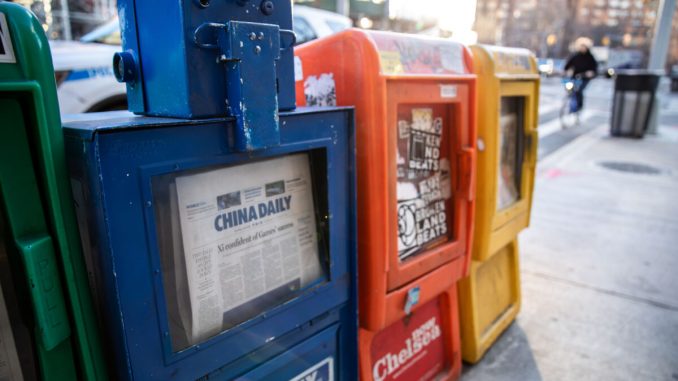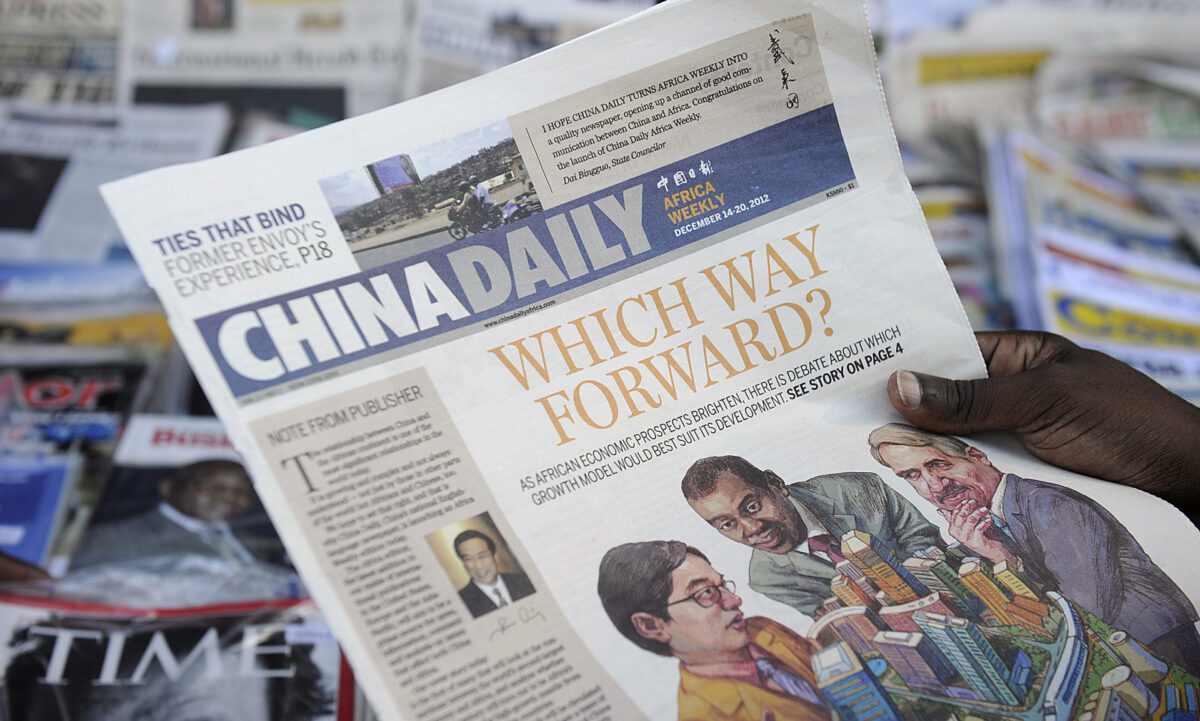
The Chinese Communist Party’s (CCP’s) propaganda mouthpiece has continued to pour millions into U.S. publications to spread its influence, a new document filed with the Justice Department shows.
China Daily, an English-language media outlet controlled by Beijing’s propaganda department, spent around $3 million on major Western outlets and publishing agencies over the past six months, according to a filing (pdf) dated May 24.
Approximately $1.6 million in advertising dollars went to Los Angeles Times, Foreign Policy, Financial Times, and Time Magazine. An additional sum of $329,898 went to The Globe and Mail, a Canadian newspaper.
China Daily also disbursed more than $1 million, a majority of which was in the United States, to have its newspaper printed. Notable recipients of the disbursements include the Los Angeles Times, The Boston Globe, The Seattle Times, Chicago Tribune, and The Houston Chronicle.
The overall spending for printing, advertising, and other expenses climbed by roughly $1.1 million, to $5.56 million between Nov. 1, 2020, and April 30, 2021, compared to half a year earlier.
China Daily was one of more than a dozen Chinese state-run media entities that the State Department designated as foreign missions of the CCP last year and required them to register their employees and U.S. properties.
Calculations by the Center for Responsive Politics, a Washington-based government transparency group, revealed that Chinese foreign-agent spending in the United States has soared six-fold over the past few years, from just over $10 million in 2016 to almost $64 million.
A number of major U.S. outlets have ceased running advertorials from the Chinese newspaper amid growing scrutiny of Chinese propaganda influence.
The New York Times deleted hundreds of paid content from its website after ending its relationship with China Daily, according to The Washington Free Beacon, which first reported on the FARA disclosure.
Los Angeles Times, Foreign Policy, Financial Times, Time, The Boston Globe, The Seattle Times, Chicago Tribune, and The Houston Chronicle did not immediately return a request from The Epoch Times for comment.
For years, the Chinese regime has spent millions of dollars running supplements, under the title of either “China Watch” or “China Focus,” in major Western newspapers.
While China Watch supplements have disclaimers in small print showing that the content is produced by China Daily and not the host newspaper, it might still be misleading to average readers, international nonprofit Reporters Without Borders (RSF) warned in its 2019 report titled “China’s Pursuit of A New World Media Order.”
“The journalistic style and the tasteful layout can easily mislead the hurried or inattentive reader who trusts the overall quality of the newspaper he reads every day,” according to the RSF report.

“Reasonably enjoyable reads and well presented, these China Watch supplements are nonetheless Trojan horses that enable Beijing to insinuate its propaganda into the living rooms of elites,” the RSF report stated.
The Chinese inserts in prominent Western media have drawn concerns from international rights groups. London-based Free Tibet launched a campaign last year, calling on a number of Western outlets to stop hosting such content.
Free Tibet sounded the alarm when a Tibet Special section within the Los Angeles Times’s China Watch supplement in November last year hailed “opportunities” offered by “vocational training” in Tibet—painting a different picture from the mass surveillance it has deployed in the region since the 1950s and the military-style training centers that experts have described as forced labor camps.
“This appears to be a deliberate attempt to whitewash a report highlighting that over 500,000 Tibetans had undergone forced labour,” Free Tibet stated in response to the special section.
The CCP has also promoted its narratives on the country’s voluntary organ donation system in China Watch, despite evidence of the state-sanctioned practice of harvesting organs from prisoners of conscience has continued to this day.
Such advertorial content has increasingly migrated into the digital realm after years of existing in hardcopy forms to reach a wider and more targeted audience.
In one recent article on Foreign Policy’s online China Watch, it criticized the “U.S. system” for not being able to fix human rights violations in the United States. In another article, China’s foreign policy called the “Belt and Road Initiative” (BRI, also known as One Belt, One Road) was promoted as contributing to “Asia’s development and global [economic] recovery.” Critics have argued that BRI put developing countries into “debt traps.”
Sen. Roger Wicker (R-Miss.) attempted to tackle the issue of Chinese propaganda in U.S. news outlets in February with a new bill (S-319), which would require “foreign agents to disclose prominently the foreign principal as the source of paid inserts placed in American news outlets.”
“It is an open secret that Beijing is waging a global propaganda war in the U.S., and American newspapers are complicit,” Wicker said in a statement in February, adding that he hopes “stronger disclosure requirements for foreign agents will encourage all American publications to refuse to participate in the CCP’s propaganda machine.”





Be the first to comment